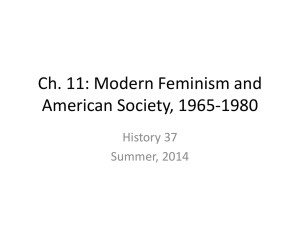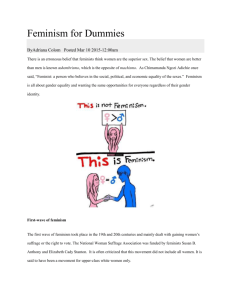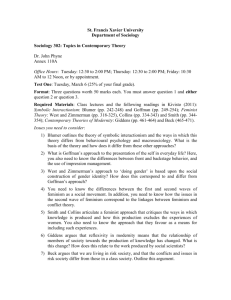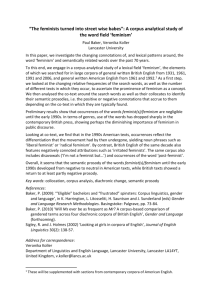a transcript of this podcast in form
advertisement
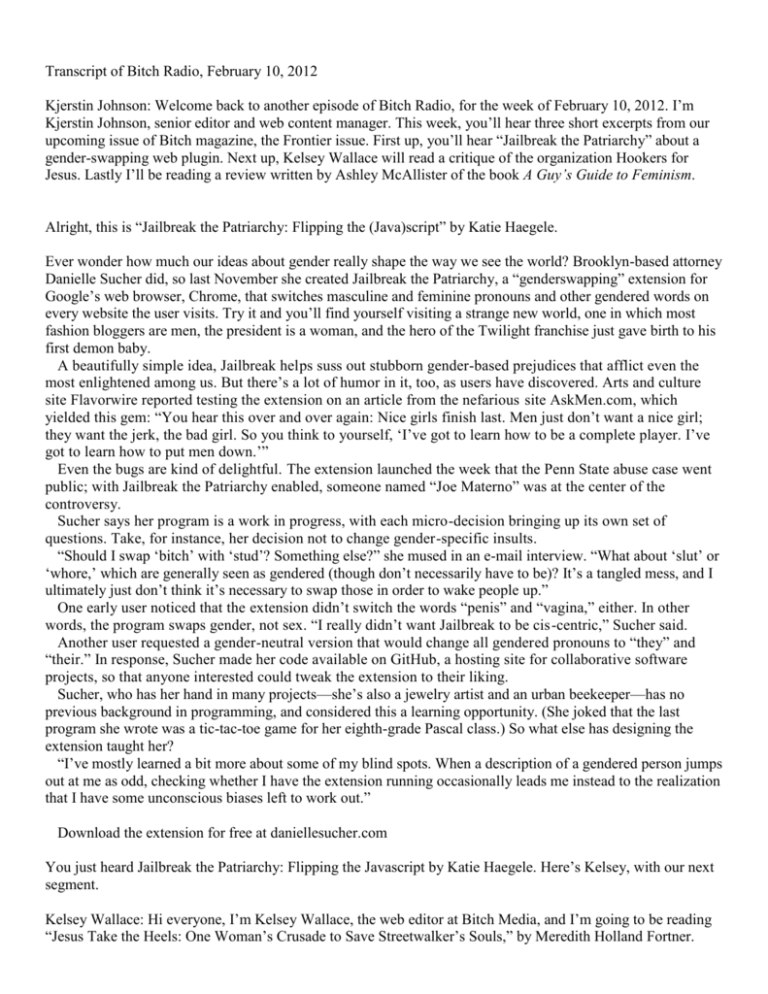
Transcript of Bitch Radio, February 10, 2012 Kjerstin Johnson: Welcome back to another episode of Bitch Radio, for the week of February 10, 2012. I’m Kjerstin Johnson, senior editor and web content manager. This week, you’ll hear three short excerpts from our upcoming issue of Bitch magazine, the Frontier issue. First up, you’ll hear “Jailbreak the Patriarchy” about a gender-swapping web plugin. Next up, Kelsey Wallace will read a critique of the organization Hookers for Jesus. Lastly I’ll be reading a review written by Ashley McAllister of the book A Guy’s Guide to Feminism. Alright, this is “Jailbreak the Patriarchy: Flipping the (Java)script” by Katie Haegele. Ever wonder how much our ideas about gender really shape the way we see the world? Brooklyn-based attorney Danielle Sucher did, so last November she created Jailbreak the Patriarchy, a “genderswapping” extension for Google’s web browser, Chrome, that switches masculine and feminine pronouns and other gendered words on every website the user visits. Try it and you’ll find yourself visiting a strange new world, one in which most fashion bloggers are men, the president is a woman, and the hero of the Twilight franchise just gave birth to his first demon baby. A beautifully simple idea, Jailbreak helps suss out stubborn gender-based prejudices that afflict even the most enlightened among us. But there’s a lot of humor in it, too, as users have discovered. Arts and culture site Flavorwire reported testing the extension on an article from the nefarious site AskMen.com, which yielded this gem: “You hear this over and over again: Nice girls finish last. Men just don’t want a nice girl; they want the jerk, the bad girl. So you think to yourself, ‘I’ve got to learn how to be a complete player. I’ve got to learn how to put men down.’” Even the bugs are kind of delightful. The extension launched the week that the Penn State abuse case went public; with Jailbreak the Patriarchy enabled, someone named “Joe Materno” was at the center of the controversy. Sucher says her program is a work in progress, with each micro-decision bringing up its own set of questions. Take, for instance, her decision not to change gender-specific insults. “Should I swap ‘bitch’ with ‘stud’? Something else?” she mused in an e-mail interview. “What about ‘slut’ or ‘whore,’ which are generally seen as gendered (though don’t necessarily have to be)? It’s a tangled mess, and I ultimately just don’t think it’s necessary to swap those in order to wake people up.” One early user noticed that the extension didn’t switch the words “penis” and “vagina,” either. In other words, the program swaps gender, not sex. “I really didn’t want Jailbreak to be cis-centric,” Sucher said. Another user requested a gender-neutral version that would change all gendered pronouns to “they” and “their.” In response, Sucher made her code available on GitHub, a hosting site for collaborative software projects, so that anyone interested could tweak the extension to their liking. Sucher, who has her hand in many projects—she’s also a jewelry artist and an urban beekeeper—has no previous background in programming, and considered this a learning opportunity. (She joked that the last program she wrote was a tic-tac-toe game for her eighth-grade Pascal class.) So what else has designing the extension taught her? “I’ve mostly learned a bit more about some of my blind spots. When a description of a gendered person jumps out at me as odd, checking whether I have the extension running occasionally leads me instead to the realization that I have some unconscious biases left to work out.” Download the extension for free at daniellesucher.com You just heard Jailbreak the Patriarchy: Flipping the Javascript by Katie Haegele. Here’s Kelsey, with our next segment. Kelsey Wallace: Hi everyone, I’m Kelsey Wallace, the web editor at Bitch Media, and I’m going to be reading “Jesus Take the Heels: One Woman’s Crusade to Save Streetwalker’s Souls,” by Meredith Holland Fortner. And just to let you know, there’s a little bit of first person in this piece, it’s from Meredith, I’m just going to be reading it. Annie Lobert had a really bad decade in the sex industry. Controlled by pimps and addicted to coke and pills, yet clinging to the illusory trifecta of diamonds, furs, and financial independence, it took an act of God to pry her loose from the business. After waking up in a hospital after an overdose, she rediscovered her faith and founded Hookers for Jesus, a Las Vegas–based, church-funded nonprofit organization that encourages prostitutes to leave the “abusive” industry and accept “God’s love” in place of a trick’s money. These days, armed with the mistaken assumption that all prostitutes are in the same dismal boat that she once was, Lobert combs the Strip with a reality TV crew in tow, seeking streetwalkers to whom she offers forgiveness and shelter in her halfway home, thus “saving” them. She calls it outreach. I call it bullshit. As a sex worker, I can sympathize with the addictiveness of the business—the money and freedom are unmatched—but we’re not all victims in need of rescuing. And God’s love isn’t exactly a promising alternative to making one month’s rent in two hours of work. Moreover, while some sex workers are in dire need of assistance, most sex workers don’t have pimps, nor are we all trafficked. Lobert also misses some important gray areas. For instance, while a prostitute may need help escaping a violent situation, she or he may not want to leave the business entirely. Lobert may get paid to tell her gruesome story as part of her Christian campus group–funded lecture circuit, but there are alternatives to her all-or-nothing, “salvation”–based approach. Solace is a San Francisco–based outreach program where local sex workers can seek a variety of services such as medical aid, counseling, help with creating a budget or bank account, home and auto repair, GED classes, and career building. Its executive director, Laura Lasky, is a self-identified Christian, but neither she nor the program focus on faith; rather, they simply support sex workers and assist with employment transition if it’s desired. Other programs, too—Sex Workers Outreach Project, Stepping Stone, the St. James Infirmary—all go well beyond Lobert’s offerings of “God’s love” and a place to sleep. Hookers for Jesus, seemingly a conversion campaign masked as outreach, provides none of the pragmatic services that sex workers’ unique lifestyles necessitate. The sex industry can be dangerous, unstable, and hard to quit, but the last thing it needs is more judgment. Kjerstin Johnson: That was Kelsey Wallace reading “Jesus Take the Heels: One Woman’s Crusade to Save Streetwalker’s Souls,” by Meredith Holland Fortner. Finally, I’m going to read a review by Ashley McAllister of the new book, The Guy’s Guide to Feminism by Michael Kimmel and Michael Kaufman, that came out from Seal Press this past November. Given that the Michaels Kaufman (Beyond Patriarchy, Theorizing Masculinities) and Kimmel (Guyland, The Gendered Society) are both writers and educators who focus on gender inequality, they seem like just the pair to introduce dudes to feminism with an A-to-Z primer. The Guy’s Guide aims to both debunk popular myths about feminism and underscore how and why feminism is important to men’s lives. And while this is a great goal, I’m sad to report that the approach they take is often problematic. First off, The Guy’s Guide was clearly written for a specific kind of guy—a straight one. Aside from hardly mentioning queer identity outside of the chapters titled “Homophobia” and “Sexual Orientation,” Kaufman and Kimmel repeatedly reference romantic relationships with women as one of the primary incentives for getting behind feminism; they go so far as to reference a Men’s Health article on how doing housework will get you laid more often. Feminism may indeed improve a straight reader’s sex life, but the book’s focus on that aspect of it erases the importance of queer men’s involvement in the conversation. Kaufman and Kimmel also oversimplify their brief explanations of race and sexual orientation as feminist issues. In the chapter “Race and Racism,” their conversation about feminism and race doesn’t go much further than explaining that “there isn’t one homogenous group called ‘women.’” Which, again, may be true, but even in a book that is explicitly 101, explorations of feminism’s relationship to race and sexuality have to go deeper. And then there are the book’s many “Um, what?” moments. Take the chapter on rape, for instance, in which Kaufman and Kimmel write that “feminist educators have been very clear…that all women must learn to be clear about their signals.” No feminist educator that I know would ever say something so victim blaming. Or the chapter titled “Vaginas/Vulvas,” in which the authors describe the vagina as “the part, if you’re a heterosexual kind of guy, that feels pretty awesome to have your penis frolicking inside.” Because they couldn’t explain the vagina without discussing what it feels like for a penis to be inside of one. Also: frolicking? Um, what? There are few books on feminism by and for male-identified folks, so I was excited to read this one. Unfortunately, it would have been more appropriately titled The Clueless White, Straight, Cis Guy’s Guide to an Oversimplified Version of Feminism. If yo u ’ r e i n t r o d u c i n g a m a l e f r i e n d t o f e m i n i sm , s tick with Feminism Is for Everybody by bell hooks. Thanks for listening! Everything you heard today and more will be in the new issue of Bitch. Look for the Frontier issue to hit mailboxes and newsstands near you in the upcoming week, and subscribe online to get your very own copy! As always, check out bitchmedia.org/audio for more podcasts, or search for us on iTunes. Today you heard music from Nite Jewel’s new album, One Second of Love, which is available from Secretly Canadian, which is due out in March. See you next week!



